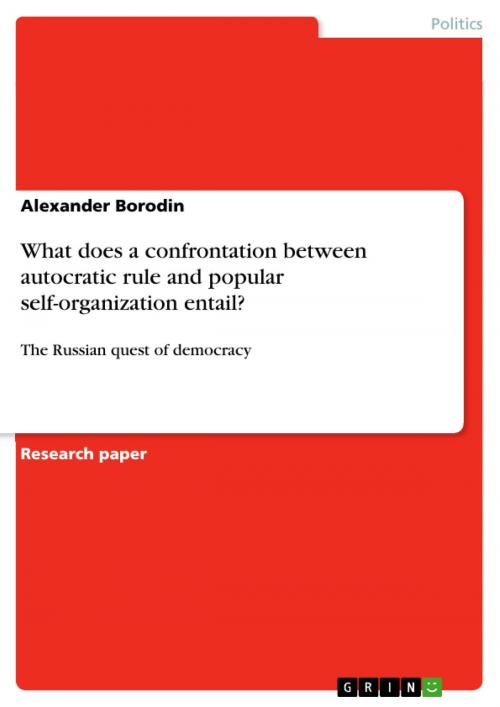What does a confrontation between autocratic rule and popular self-organization entail?
The Russian quest of democracy
Nonfiction, Social & Cultural Studies, Political Science| Author: | Alexander Borodin | ISBN: | 9783656262053 |
| Publisher: | GRIN Publishing | Publication: | August 23, 2012 |
| Imprint: | GRIN Publishing | Language: | English |
| Author: | Alexander Borodin |
| ISBN: | 9783656262053 |
| Publisher: | GRIN Publishing |
| Publication: | August 23, 2012 |
| Imprint: | GRIN Publishing |
| Language: | English |
Research Paper (undergraduate) from the year 2012 in the subject Politics - International Politics - Region: Russia, grade: 78, University of Essex (Department of Government), language: English, abstract: Before forming any assessment regarding the presence of liberal democracy in contemporary Russia it is vital to investigate how conditions that either favour or harm the emergence of liberal democracy are fulfilled on an economic, social and political level. Using Robert Dahl's criteria of an 'ideal democracy' (p. 33, Dahl, 1998) as a theoretical framework will serve us to contextualize Russia's current development to the notion of an ideal democracy. After balancing out the insights we gain throughout our investigation of the underlying features of the Russian system and the principles it relies on, we can then proceed to develop hypotheses with regard to the question of whether Russia is likely to become a liberal democracy in the short and long run. In what will follow, I shall argue that despite the considerable economic growth in its market economy, Russia's highly centralised government with a super-presidency combined with a still largely depoliticized society, which lacks indispensable underpinnings in terms of self-organization and belief in democratic values, imply that a transformation of society is a necessary antecedent to Russia becoming a genuine liberal democracy.
Research Paper (undergraduate) from the year 2012 in the subject Politics - International Politics - Region: Russia, grade: 78, University of Essex (Department of Government), language: English, abstract: Before forming any assessment regarding the presence of liberal democracy in contemporary Russia it is vital to investigate how conditions that either favour or harm the emergence of liberal democracy are fulfilled on an economic, social and political level. Using Robert Dahl's criteria of an 'ideal democracy' (p. 33, Dahl, 1998) as a theoretical framework will serve us to contextualize Russia's current development to the notion of an ideal democracy. After balancing out the insights we gain throughout our investigation of the underlying features of the Russian system and the principles it relies on, we can then proceed to develop hypotheses with regard to the question of whether Russia is likely to become a liberal democracy in the short and long run. In what will follow, I shall argue that despite the considerable economic growth in its market economy, Russia's highly centralised government with a super-presidency combined with a still largely depoliticized society, which lacks indispensable underpinnings in terms of self-organization and belief in democratic values, imply that a transformation of society is a necessary antecedent to Russia becoming a genuine liberal democracy.















